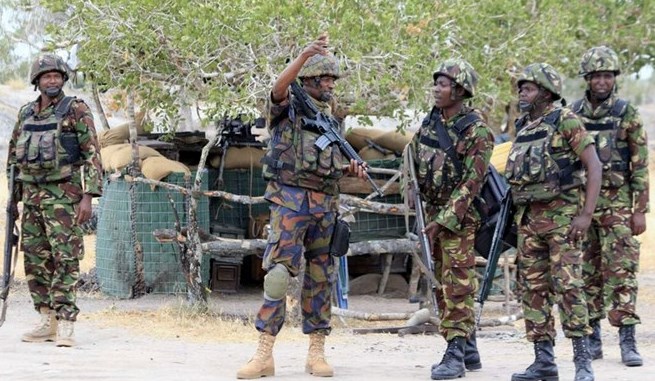
Thursday March 17, 2022

More than 10 Kenyan soldiers have been killed by a roadside explosive in southern Somalia, according to the family of one of those who died.
Neither the government nor Kenya Defence Forces (KDF) have made an official comment about the deaths - to the anger of Prof J Ole Kiyiapi, who said on Twitter that his brother, Johnson Olemoi Kiyiapi, was one of those who were killed.
Prof Kiyiapi, a former presidential candidate, told the BBC he was disappointed with the authorities “for not acknowledging and honouring the deaths of the heroes”.
He said the family found out about the death of his younger brother on Tuesday after military officials visited their rural home in the Rift Valley, but there had been no official statement.
“This is what is making me angry and sad. These young men were ready and have paid the ultimate price protecting their country, but it’s as if the KDF wants to keep this thing a secret,” he told the BBC.
“Look at how the US treats their fallen soldiers in war, they are given respect and acknowledged, yet here days after the government and the military have just been silent.”
Reports of the attack first appeared on local media in Somalia on Monday, with al-Qaeda-linked al-Shabab fighters suspected to be behind it.
Five other soldiers were also reportedly seriously injured when their vehicle ran over an improvised explosive device in the Gedo region, near the Kenya-Somalia border.
They are part of the 22,000-strong African Union mission in Somalia - a force deployed to the country to help the federal government fight the militants.
Hundreds of Kenyan soldiers have died fighting al-Shabab - one of the most deadly incidents came in January 2016 when militants attacked an African Union base in El Ade in south-western Somalia.
Experts and the Somali government estimate the Kenyan death toll was in the hundreds, but six years on there has been no official number released. The KDF rarely issues casualty numbers.
The deaths of this group of soldiers has reignited calls by Kenyans on social media for the troops to be returned home.
Kenya first sent its troops into Somalia in 2011 after al-Shabab fighters kidnapped two tourists.
There has been been a surge in attacks in Somalia targeting public areas, government installations and security check points in recent months.
It comes as the country grapples with a much-delayed parliamentary election, with analysts saying the rise in attacks is meant to scuttle the process that will culminate in elected MPs selecting a new president.